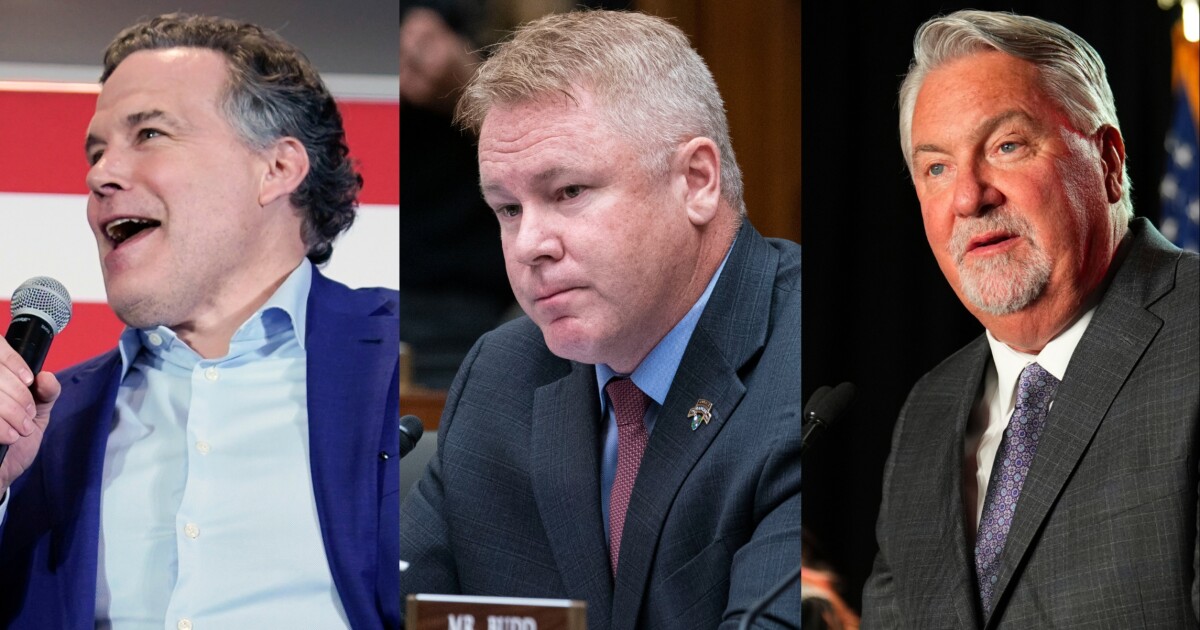

Top-tier recruits for competitive down-ballot GOP contests have been slow to announce candidacy.
Top Republicans, particularly on the Senate side, have aggressively sought after candidate quality and appear to view the recruitment process as paramount to the party’s odds of recapturing the Senate or growing their majority in the House. Despite many prized recruits not entering key races right away, it is still early in the 2024 election cycle.
EVERYTHING YOU NEED TO KNOW ABOUT TIM SCOTT AHEAD OF HIS BIG 2024 ANNOUNCEMENT
Sen. Steve Daines (R-MT), who leads the National Republican Senatorial Committee, has reportedly sought to take a more hands-on approach in contrast to the Senate campaign arm’s approach last cycle. Senate Minority Leader Mitch McConnell (R-KY) has conveyed this sentiment publicly.
“We’ll be involved in any primary where that seems to be necessary to get a high-quality candidate, and we’ll be involved in every general election where we have a legitimate shot of winning — regardless of the philosophy of the nominee,” he told CNN.
Perhaps the most notable target is businessman David McCormick, a man who barely lost his primary for Pennsylvania Senate last time but whom some strategists believe poses the best shot of winning in 2024. McCormick has made moves to signal a run, such as publishing a book and keeping a high profile around the Keystone State.
He has kept his options open, as incumbent Sen. Bob Casey (D-PA) has already opted to vie for reelection. Meanwhile, state Sen. Doug Mastriano has teased he will make his 2024 Senate decision known soon. Mastriano lost the governor’s race handily in 2022 against Josh Shapiro, raising concerns about his prospects for the upper chamber.
Given that Pennsylvania was the only major flip in the Senate in 2022, it is top on the GOP’s list of states to reclaim.
Out west in Colorado, businessman Joe O’Dea has been eyed for a congressional seat but has not committed to jumping into the fray. Specifically, some believe he’d be competitive against incumbent Rep. Yadira Caraveo (D-CO), per Politico.
O’Dea ran an unsuccessful but spirited contest against incumbent Sen. Michael Bennet (D-CO). Democrats mounted a spoiler campaign against him during his primary.
Further north in Montana, the NRSC appears to have its sights set on Navy SEAL and businessman Tim Sheehy for the state’s Senate race. He has not yet entered, but the fiscally conservative Club for Growth has publicly endorsed Rep. Matt Rosendale (R-MT), who is also flirting with a run.
Incumbent Sen. Jon Tester (D-MT) is widely viewed as one of the most vulnerable Senate Democrats in the 2024 election cycle.
The most vulnerable Democrat on the Senate side is widely believed to be Sen. Joe Manchin (D-WV). Republicans have been successful in recruiting Gov. Jim Justice (R-WV), who has polled the strongest against Manchin, into the race.
On the East Coast, some Republicans have sought to recruit police veteran and unsuccessful lieutenant governor contender Alison Esposito in the race to dispatch Rep. Pat Ryan (D-NY), according to Politico.
Juxtaposing the sluggish nature of some of these key down-ballot recruits, the battle for the 2024 GOP nod is growing increasingly crowded with a melange of aspirants on the sidelines trickling into the arena. Sen. Tim Scott (R-SC), for example, is expected to enter the arena Monday, while Gov. Ron DeSantis (R-FL) is rumored to file his paperwork imminently.
But the national brawl to be the GOP standard-bearer could have some downstream ripple effects on the recruitment process.
“Some people have asked me, ‘Should I run next year?’ If you’re in a swing district, I said, ‘No,’” former Rep. Barbara Comstock (R-VA) said, per Politico. “If [Trump’s] going to be the nominee, you are better to wait and run after he washes out. Because you won’t have a prayer of winning.”
CLICK HERE TO READ MORE FROM THE WASHINGTON EXAMINER
Republicans were widely expected to surf the red wave in the 2022 midterm election cycle but barely flipped the House and lost ground in the Senate. Some in the party have faulted Trump, but his backers have roundly rejected that notion.
Heading into 2024, Republicans have an advantageous Senate map, only having to defend 11 seats compared to the Democrats’ 23, including three held by Democratic-aligned independent senators. On the House side, multiple leftover redistricting court battles appear to be trending their way in places such as North Carolina.





